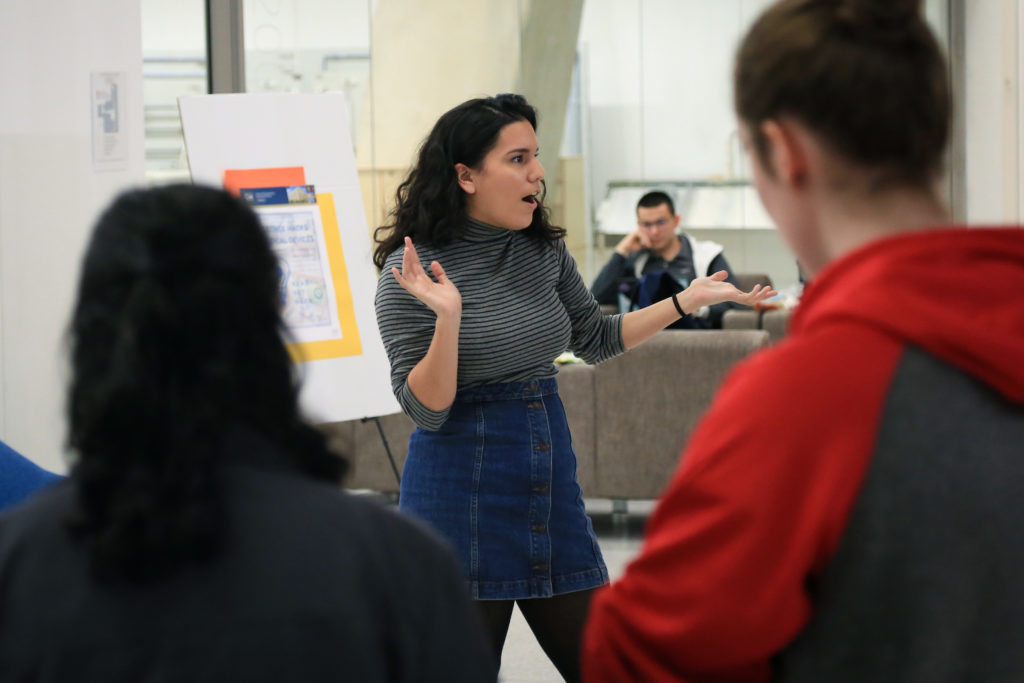University President Thomas LeBlanc will personally match donations made to the senior class fundraising campaign this spring, the campaign’s coordinators announced Sunday.
Senior class gift coordinators Bethany Perez and Luke Scuitto announced at a fundraising event Sunday night that LeBlanc has pledged to give $1,000 of his own money for every 1 percent of the senior class that pledges to make recurring donations to the University. The campaign’s organizers said LeBlanc’s involvement will encourage seniors to give by demonstrating his commitment to the cause.
Perez and Scuitto announced LeBlanc’s involvement in the campaign in a Monopoly-themed video presented at an event in the Science and Engineering Hall.
Perez and Scuitto said the money matched by LeBlanc will go toward creating more student space on campus, but no specific project has been determined. Perez said she and Scuitto plan to work with student leaders to decide whether they should create a new space or improve an existing one.
LeBlanc said the senior campaign’s organizers approached him to talk about the campaign, saying the typical participation rate for sustaining gifts in the senior class is about 10 percent. LeBlanc said he hoped to boost it to 20 percent this year.
Sustaining donations include all gifts that are not one-time-only contributions.
Perez said the matching challenge started Sunday and will continue until the campaign ends in May, hopefully meeting its goal of having half the senior class donate. She said LeBlanc’s involvement shows how he wants to connect with students and improve their experience on campus.
“It’s really amazing that it’s his first class and he’s only known us for like a semester, that he was willing to offer this up and understands how important student space is – especially with our campus being a city campus,” she said.
Perez said LeBlanc’s matching of sustaining gifts will incentivize students to stay connected to GW after they graduate.
“We’re trying to get more sustaining gifts than the previous year, which is why for this challenge there is a focus on sustaining gifts, so we’re hoping to use that to incentivize students a little more to stay connected with the University because LeBlanc will be here when we graduate, so kind of staying tied to GW,” Perez said.
Officials have long sought to boost GW’s 9 percent alumni giving rate. The Board of Trustees formed a task force last fall to investigate how to increase former students’ engagement with the University.
Senior campaign leaders have made sustaining gifts a focus in recent years. This year, the campaign has placed an emphasis on recurring gifts rather than one-time gifts, with a goal of attracting the most recurring donations in class gift history.
Last year’s senior class gift campaign raised $20,000 more than the previous year’s campaign and attracted a record number of sustaining gifts, but organizers didn’t say if they’d reached the participation goal of 50 percent.
This year’s coordinators have also encouraged students to give to organizations that they were involved throughout their time at GW to highlight the diversity of interests within the class.
Perez called the matching challenge a “win-win” for students because they can donate to a department or organization that’s important to them, and then that money could be matched with LeBlanc’s $1,000 which would then benefit student space.
Student space has long been a contentious issue on campus with student leaders frequently facing off with administrators for more community areas. The newly renovated Marvin Center first floor opened at the beginning of this year with more seating and a new dining vendor for students.
“Your small organization benefits, but then the wider GW community also benefits,” Perez said.
Nancy Peterman, a partner at Alexander Haas – a national fundraising consulting firm – said LeBlanc’s commitment highlights the importance of sustaining gifts.
“It appears that he’s very generously calling attention to the importance of sustaining gifts to the institution, and he feels it’s so important that he’s willing to put his own dollars behind it to highlight that and encourage that for others,” Peterman said.
Peterman said that while all university presidents normally get involved in giving campaigns, her company has noticed that presidents themselves are increasingly actually matching gifts to encourage participation. For example, the president of the University of California system committed to a matching campaign in 2014.
Former University President Steven Knapp presided over the campaign toast at Commencement weekend, but this is the first time a GW president has had a personal financial stake in the effort.
She said this strategy has not been well tested, but from what she has noticed, campaigns tend to do better when a president matches gifts.
“It certainly gets a lot of attention,” Peterman said. “It has demonstrated enthusiasm for campaigns, and then the campaign has met or exceeded its goals.”





